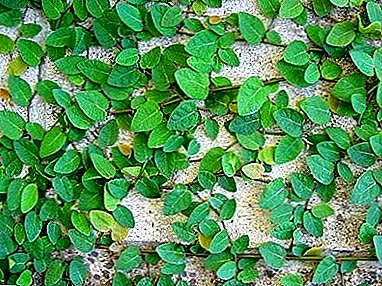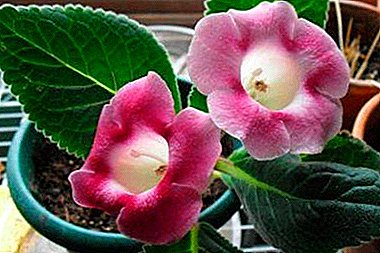
One of the well-established symbols of home comfort over the years has been considered a ficus.
True, this plant gradually along with geraniums and canaries migrated to the category of petty-bourgeois attributes.
Nevertheless, interest in the "exotic" culture has not faded.
One of the most promising areas was the breeding of the ampelous forms of ficus.
general description
Ficus - a large genus of tropical plants, which, in addition to large trees and shrubs, includes liana-like species.
From their "ground" counterparts, they differ in smaller size and the ability to curl up, relying on the support.
Man has long been "domesticated" this amazing plant.
Tree and shrub individuals have taken their place in large cocks, and creepers are grown as ampelous plants in hanging vases in rooms and in backyard plots.
Amppelny ficuses, thanks to their "climbing" abilities, look great in the interior.
 In this group, the following types are best known:
In this group, the following types are best known:
- Mountain ficus (Ficus montana). Liana with leaves similar to oak leaves, and with a significant pubescence pubescence.
Motherland - Indonesia, Malaysia. - Creeping ficus (Ficus repens). A plant with bright green foliage and powerful suckers with the help of which it can cling to any surface.
Motherland - Japan. - Ficus rooting (Ficus radicans). Differs in thin stalks and small dark green leaves.
Motherland - India. - Dwarf ficus (Ficus pumila). Good climbing ensures its thin shoots numerous roots.
Motherland - Indochina.
Home care
Growing ficus-ampel is a matter of average complexity. First you need to choose the optimal place for the plant in the room.
This is usually the east or west window. Naturally, the room should be warm.
The lighting should be average. This flora does not like direct sunlight as well as dense shade.
Artificial lighting is possible.
To ensure the normal growth of ficus, it is necessary to feed it twice a month with liquid organic and mineral fertilizers.
These procedures are carried out from May to September.
Air humidity
Probably the most important condition for the optimal development of the ampelous ficus is the presence of air with high humidity in the room.
Since dry air can lead to the death of an individual, it must not be placed near heating systems.
With insufficient humidity, weekly warm abundant water "shower" of lianas takes place. Ficus leaves should be regularly sprayed with water in between.
Watering
 Water the houseplant all year round - regularly, but carefully.
Water the houseplant all year round - regularly, but carefully.
It is usually recommended to do this. in the summer, twice a week; in the winter, once a week.
But in practice it is necessary to pay attention to the state of the plant and the soil and adjust the amount of moisture accordingly.
Thus, individuals with strong roots consume more water than their “brothers” with a weak root system.
The soil must be maintained in such a condition that it always gives the impression of being somewhat wet.
Bloom
If someone wants to wait from the ampelous ficus of beautiful flowers, he will have to be disappointed.
The fact is that these ficuses at home do not bloom.
Breeding
Breeding These plants occur in the spring of leaf and stem cutting.
When rooting cuttings should be intensively sprayed and heated to 24-26 ° C.
Crown formation
Ficus shoots and branches are regularly pruned to form a decorative crown.
In this case, the plant owner himself has to determine where to direct the growth.
According to the chosen direction and the main trimming is done.
And it can be done safely, as the ficus usually easily transfers this procedure.
Priming
As for the composition of the soil, it is better to do it mixed - from leaf, greenhouse and turf soil, to which add sand and bone meal. At the same time it is necessary to provide soil drainage.
Landing and installation
For ampelous ficuses annual transplant recommended with the renewal of fertile soil.
Temperature
Ficus grow well at high temperatures. In the summer, it is advisable to take them to fresh air, and in winter it is necessary to ensure that the room atmosphere is at least heated. up to 17-21 ° C.
Tip: one should always remember that these plants are very afraid of drafts and sharp temperature fluctuations.
Important: ficus "out of turn" can be transplanted only if the plant has been "flooded", and there is also a suspicion of pest attack.
A photo
In the photo ficus "Ampely":





Benefit and harm
Like many other representatives of the flora, ampelous ficuses are very useful for maintaining a healthy microclimate in the room.
These plants act as effective physiological "cleaners" of a number of chemicals harmful to humans that are present in the air, primarily phenol, benzene, and trichlorethylene.
Absorbing the particles of these chemicals, ficuses process them into amino acids and sugar.
Of course, the beautiful appearance of green plants improves mood, promotes effective relaxation.
Diseases and pests
Despite the fact that the ficus came to us from exotic countries, practically no "exotic" diseases disturb this type of plants.
If plant diseases and insect pests affect ficus, then the most common and inherent in other room flora.
Among the main enemies of the ficus - aphid, mushroom gnat, scypovka, lozhnoashchikov, thrips, spider mite, mealybug, nematode.
To effectively deal with these plagues, use special drugs against pests or use "folk remedies" (soap solution, tobacco infusion, etc.).
Important: Most apartments can not boast of normal humidity. Therefore, in the room where ficus grows, it is recommended to additionally install a humidifier.
If the grower will take into account all the features of home care for the ampely ficus, he will surely reciprocate and give his owner many positive emotions.












